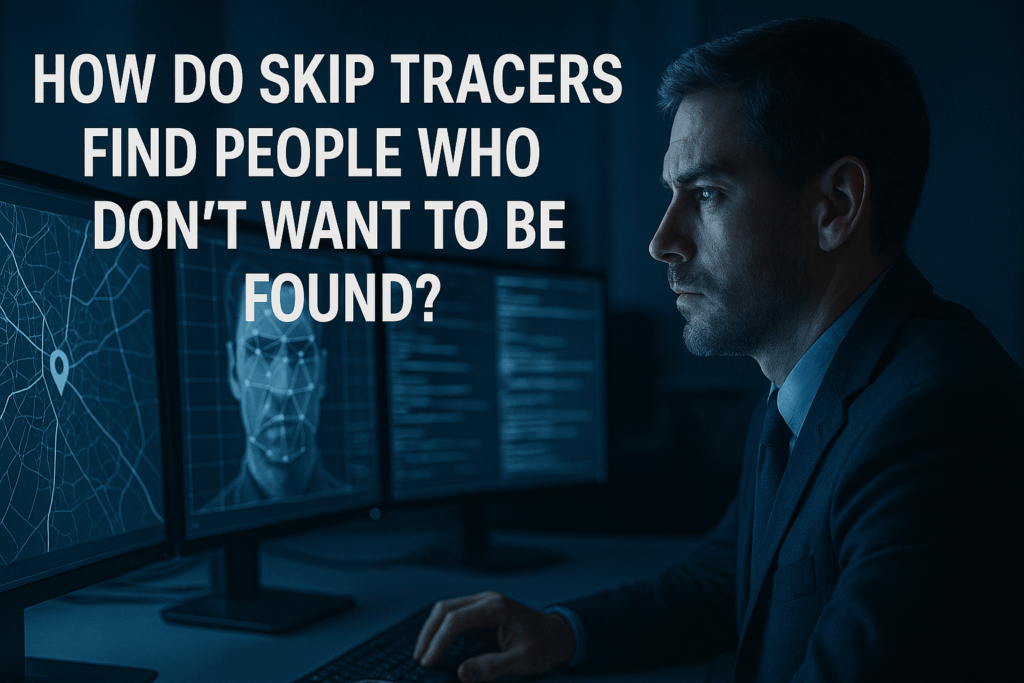In today’s digital world, almost everyone leaves behind an electronic footprint — but what happens when someone intentionally tries to erase it? That’s where skip tracers come in. How do skip tracers find people.
Skip tracing is the process of locating individuals who are missing, avoiding contact, or concealing their whereabouts. Professional skip tracers combine technology, legal data sources, and investigative experience to uncover information that most people can’t access. How do skip tracers find people.
In this article, we’ll explore how do skip tracers find people who don’t want to be found, the techniques they use, and why hiring a professional makes all the difference.
What Exactly Is Skip Tracing?
Skip tracing comes from the phrase “to skip town,” meaning to leave suddenly or without notice. Skip tracers are trained professionals — often licensed private investigators — who use both digital and field-based methods to locate individuals for legitimate reasons, such as:
- Debt recovery or loan default
- Missing persons or heirs
- Legal investigations and court summons
- Fraud detection
- Family or personal reconnection
Unlike a simple Google search, professional skip tracing uses verified data sources and legal investigative techniques to track individuals who may have changed their address, phone number, job, or even country.
The Science Behind Skip Tracing: Combining Data and Human Insight
Skip tracing is not guesswork — it’s a precise process involving data analytics, investigation, and human judgment.
Here’s how professionals do it:
1. Accessing Specialized Databases
Skip tracers have access to databases unavailable to the public. These include:
- Credit bureau and utility records
- Property ownership and lease records
- Vehicle registrations
- Business licenses and corporate filings
- Social media and digital footprints
These databases are often regulated under privacy and compliance laws such as the Fair Credit Reporting Act (FCRA) and PIPEDA (Canada). Only licensed investigators can legally access them for legitimate purposes.
2. Cross-Referencing Multiple Data Points
A skilled skip tracer doesn’t rely on a single source. They cross-verify information from dozens of databases to spot patterns and inconsistencies.
For example:
- A phone number linked to a new address
- A utility account opened under a relative’s name
- A new vehicle registration near a previous location
By connecting these dots, skip tracers can build a complete, factual profile of the individual — often with surprising accuracy.
3. Social Media and Online Behavior Analysis
Even when people hide, social media often reveals clues — photos, comments, or tagged locations.
Skip tracers use open-source intelligence (OSINT) to analyze:
- Social media posts and timestamps
- Tagged locations or check-ins
- Connections with family, friends, or colleagues
A single post, like “enjoying coffee at XYZ Café,” can help narrow down a search radius.
4. Interviews and Human Intelligence (HUMINT)
Professional skip tracers are also skilled communicators. They often conduct interviews and discreet inquiries with:
- Former landlords
- Neighbors
- Employers
- Family members
By combining empathy with strategy, they gather insights others might overlook — always within ethical and legal boundaries.
5. Digital Forensics and Cyber Investigation
Advanced skip tracers leverage digital forensics to analyze:
- IP addresses
- Online transactions
- Email headers
- Digital footprints left behind by devices
In some cases, even a small piece of digital evidence (like a reused username or online purchase) can lead to a confirmed location.
6. Field Investigation and Surveillance
When online trails go cold, skip tracers use physical verification methods:
- On-ground visits
- Vehicle or property checks
- Local inquiries and surveillance
This hands-on approach confirms digital leads and ensures real-world accuracy. How do skip tracers find people.
Legal and Ethical Boundaries in Skip Tracing
While skip tracing is powerful, it operates under strict legal frameworks. Licensed professionals adhere to:
- Privacy laws (PIPEDA, GDPR, FCRA)
- Harassment and stalking regulations
- Permitted purpose guidelines for data usage
A legitimate skip tracer always prioritizes lawful and ethical investigation. They locate individuals without violating privacy or crossing ethical lines.
Why Hiring a Professional Skip Tracer Matters
DIY online searches can only go so far — professionals bring:
- Access to restricted data sources
- Experience interpreting complex information
- Legal compliance and confidentiality
At Atlas Private Investigations, our experts use cutting-edge tools and years of field experience to find people efficiently, accurately, and ethically.
Real-World Scenarios Where Skip Tracing Helps
| Situation | Skip Tracing Purpose |
| Debt Recovery | Locating default borrowers or absconding debtors |
| Legal Services | Finding witnesses, defendants, or missing heirs |
| Fraud Investigation | Tracking identity theft or financial scams |
| Real Estate | Tracing property owners or absentee landlords |
| Personal Reasons | Locating estranged family members or friends |
Final Thoughts
Finding people who don’t want to be found isn’t about luck — it’s about skill, data, and ethics.
Professional skip tracers combine technology with investigative experience to uncover truth while maintaining legal and moral integrity.
If you need to locate someone — for legal, financial, or personal reasons — hiring a licensed investigator ensures you get accurate results while staying compliant with the law.
About Atlas Private Investigations
At Atlas Private Investigations, we specialize in Skip Tracing Services in Mississauga and the Greater Toronto Area.
Our team of experienced private investigators uses advanced analytics, legal compliance, and professional discretion to locate individuals across Canada.
Contact us today to learn how we can help you find the answers you’re searching for — legally, ethically, and confidentially.

